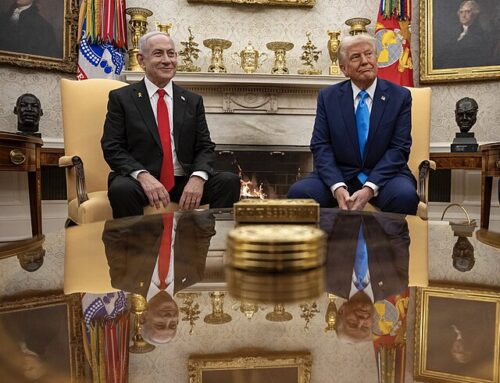At a meeting that took place [Jan. 31, 2007] in Jerusalem between the Irish Foreign Minister Dermot Ahern and Meretz-Yachad party chair Yossi Beilin, the Foreign Minister declared that while Syria is definitely part of the problem in the Middle East, it must also be included as part of the solution. The Foreign Minister suggested applying to the Israeli-Arab conflict the lessons learned from the Irish struggle and the methods used to solve that situation. Beilin stated that a joint [Hamas-Fatah] Palestinian government that would give Abu Mazen a mandate to negotiate with Israel, currently seems to be the only chance for renewing the Israeli-Palestinian peace process, and it would be wrong for the international community and the European Union to miss such an opportunity if it should become possible.
Dear Friends:
I have not written in a while, and I thought I would send you this brief update on how I see some of the developments that have been unfolding here over the past couple of months, both at the level of the peace process and internally.
On the Palestinian front, the most worrisome development has been the violence that has erupted between Hamas and Fatah factions, and the failure to reach agreement on the formation of a new Palestinian government. This is bad news not only for the Palestinians, of course, but also for Israel, who needs a single and stable Palestinian partner if it is serious about moving the political process forward. Given the election results from January last year, the only government that seems feasible right now is a national unity government that will include both Hamas and Fatah, and perhaps representatives from several smaller parties as well. Rather than wait, as some would urge us, for a miraculous disappearance of Hamas, Israel should look forward to its integration in a national unity government, provided of course that such a government meets at least some of the basic criteria set out by the international community.
On the Syrian front, the most interesting development has been the Ha’aretz report [that] understandings on a peace agreement between Jerusalem and Damascus were formulated in a series of a track-two (or unofficial) secret meetings in Europe between September 2004 and July 2006. Unfortunately, Olmert reacted to the report by categorically denying its contents and rejecting its implications, suggesting that Olmert is determined to scuttle any opportunity for engagement with Syria. Even if the Ha’aretz report were inaccurate, or the understandings themselves not acceptable to the government, Olmert would have done better to probe or to question than to reassert a policy that seems determined to say only no to peace.
Partly in response to the deadlock in the peace process, Israel is undergoing a period of deep introspection. Dominating the news here these past couple of weeks has been Israel’s attorney general announcement of his intention to indict President Moshe Katsav. The Meretz-Yahad Party believes that, under the circumstances, President Katsav must resign. Although as a private citizen Katzav is entitled to the legal presumption of innocence until proven guilty, the Meretz-Yahad party believes that, as president of the State of Israel, Katsav must adhere by the highest normative standard and, therefore, resign from office. Regrettably, in response to the attorney general’s announcement, Katsav dismissed the charges against him as a grand conspiracy, blaming the police, the media, the Knesset and the office of the attorney general for colluding against him. For that speech alone, Katsav must resign without delay. As you know, Katsav has asked instead for a leave of absence, refusing to step down. In response, the Meretz-Yahad Party is leading an initiative to impeach Katsav.
Regardless of whether there is the required special majority in the Knesset for forcing Katsav out of office, his seven-year term will be over by July, and the question of who will succeed him is gathering momentum. In this regard, the potential candidacy of Shimon Peres is stirring the political waters in the form of a proposed amendment to one of Israel’s Basic Law. The amendment would turn the election for president in the Knesset plenum from a secret to an open ballot. I have come out against this proposed amendment, which amounts to changing a Basic Law in an ad hoc and – what is worse – ad hominem fashion. A Basic Law must not be changed for one person. My objection to the amendment is not only constitutional but also political, since I believe that an open ballot would make the presidency part of the “coalition booty” that is adversely affecting already so much of Israeli politics. In fact, the proposed amendment itself is already just that, with Prime Minister Olmert indicating he will throw his full weight behind the effort to get the amendment passed in conjunction with giving additional portfolios to Avigdor Lieberman’s party (Yisrael Beiteinu) and appointing a welfare minister.
Katsav is only one of several Israeli leaders who are either under investigation or, as in the case of Haim Ramon, convicted. Olmert is facing an investigation into his actions in a bank privatization in 2005, and both he and Defense Minister Amir Peretz are awaiting the results of the Winograd Commission that is looking into the war in Lebanon over the summer. At the same time, several other corruption scandals are tainting the national air, the newest one being an investigation into influence-peddling in Israel’s tax authority.
Not a pretty picture, but one that propels us at the Meretz-Yahad Party to continue our campaign against political corruption. Even though corruption is not an easy issue around which to rally the public, it is one that we must place as the highest priority if we are to be true to ourselves and to the values we espouse.



Leave A Comment